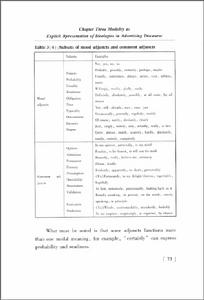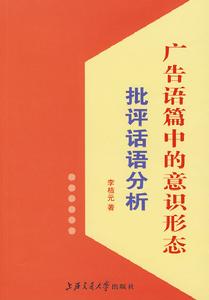內容簡介
本書是語言學領域內有關批評話語分析的專著,也是第一本對廣告語篇系統進行批評性研究的著作。批評話語分析是近年來國外發展迅速、國內正在興起的一門關於語篇分析的理論與實踐的學科。本書從理論上進一步釐清了批評話語分析的幾個核心概念和結構體系,從實踐上對作為公共語篇的廣告語篇進行了較為系統的批評性分析,這在批評話語分析的具體套用上作出了有益的探索。
作者簡介
 李桔元照片
李桔元照片李桔元,湖南省新化人,文學博士,杭州師範大學外國語學院副教授,碩士生導師,中國高校功能語言學研究會會員。主要研究興趣為功能語言學、語篇分析以及英語教學等。在外語類核心期刊及其它重要期刊上發表學術論文20餘篇,參編省級規劃本科教材和詞典各1部,主持並完成省教育廳課題1項、其他課題4項,主持校研究生優質課程建設1項,參與國家社科課題1項、省社科課題3項,曾作為第一主講教師參與省級本科精品課程《綜合英語》建設。
圖書序言
廣告自從產生以來,受到各個領域專家學者極大的關注,對其研究甚為廣泛,其中大多數是從新聞學、傳播學、經濟學、美學及心理學等角度進行的。廣告語言也以其獨特的魅力引起了語言學界的興趣。在國外,過去的50年中,出版了好幾部有關廣告語言的專著。研究範圍包括英語廣告的語音、語法和辭彙特點,廣告的符號學分析,廣告語篇理解,廣告的語體以及廣告的語篇研究。國內也有一些學者對廣告語言進行研究,從外語界的情況看,研究廣告語言的角度主要有:辭彙語法句式和修辭研究,文化研究,語體研究,語用研究,功能語言學研究等。國內外現有研究從不同層面和角度對廣告語言進行了深入的探討,揭示了廣告語篇的辭彙句法特點、語篇特點以及語用規律。
朱永生(2003)在回顧話語分析時指出,話語分析的任務之一就是揭示話語的語義結構與意識形態之間的關係。本書嘗試從批評話語分析角度研究廣告語篇中的意識形態。
批評話語分析認為,話語不但能傳達信息、表達外在和內在的經驗、建立人際關係,而且能用於表達價值觀、信仰、態度。廣告話語作為一種策略性公共話語,其特徵是通過話語中的信仰、態度、支配等策略實現廣告對讀者的操縱。
圖書目錄
Acknowledgements
List of Figures and Tables
Chapter One Introduction
1.1 Background of studies of advertising language
1.2 Research questions and significance of this study
1.3 Theoretical and methodological orientations of this study
1.4 Data collection
1.5 Organization of the dissertation
Chapter Two Theory Preliminaries
2.1 Introduction
2.2 Critical discourse analysis
2.2.1 From discourse analysis to critical discourse analysis
2.2.2 A survey of critical discourse analysis
2.3 The view of discourse in critical discourse analysis
2.3.1 Discourse vs. Text
2.3.2 Discourse as action
2.3.3 Discourse as ideologies
2.4 Ideology and power in language
2.4.1 Ideology
2.4.2 Power
2.4.3 The relationship among language, ideology and power
2.5 The text-oriented framework for analysing ideologies
2.5.1 Hallidayan paradigm : text functionality in context
2.5.2 Framework for analysing ideology in discourse: Fairclough' s three-dimension model
2.6 Summary
Chapter Three Modality as Explicit Representation of Ideologies in Advertising Discourse
 插圖
插圖3.1 Introduction
3.2 The ideological nature of modality
3.3 Meaning dimensions and grammatical devices of modality
3.3.1 Meaning dimensions of modality
3.3.2 Grammatieal devices of modality
3.4 Modality and its ideological meanings in advertising discourse
3.4.1 Ideological meanings of modality in advertising disco urse: a case study
3.4.2 Modality distribution in advertising texts: empirical studies
3.5 Summary
Chapter Four Personal system as Representation of
Ideologies in Advertising Discourse
4.1 Introduction
4.2 The functions of personal pronouns:SFL perspective
4.3 The politics of some personal pronouns
4.3.1 "them and us" attitude
4.3.2 "me" and "you" :subjectivity or empathy
4.4 Ideological meanings of personal pronotms in ads
4.4.1 Characteristics of use of personal pronouns in ads
4.4.2 Personal pronouns work ideologically in building relations
4.5 Snmmary
Chapter Five Transitivity as Implicit Representation of Ideologies m Advertising Discourse
5.1 Introduction
5.2 Transitivity as the construal of experience
5.3 Transitivity as representation of ideologies
5.4 Transitivity system and the power relations in advertising discourse
5.5 Summary
Chapter Six Intertextnality as Representation of Ideologies in Advertising Discourse
6.1 Introduction
6.2 What is intertextuality
6.2.1 Bakhtin:dialogism and heteroglossia
6.2.2 Kristeva:intertextuality as dialogue between texts or text and social context
6.2.3 Other interpretations of the term "intertextuality"
6.2.4 Intertextuality and interdiscursivity
6.3 The ideological functions of intertextuality
6.4 Intertextuality as hegemonic struggle in advertising discourse
6.5 Summary
Chapter Seven Conclusion
7.1 Summary of this dissertation
7.2 Major findings
7.3 Limitations of this study
7.4 Suggestions for further research
Appendices
Bibliography
編輯推薦
《廣告語篇中的意識形態:批評話語分析》首先對國內外廣告語言研究作了一個回顧並且分析了現有研究的局限性,然後提出《廣告語篇中的意識形態:批評話語分析》的研究範圍、目標以及理論取向和方法。其次對批評話語分析的理論進行綜述,包括歷史發展、理論流派,重點探討了批評話語分析理論中的三個關鍵概念:話語、權力、意識形態以及三者之間的關係;最後描述了《廣告語篇中的意識形態:批評話語分析》用於分析廣告文本的理論框架。而後對廣告語篇意識形態的多角度分析。最後對全書的討論作總結,概述了研究發現、研究的不足。

